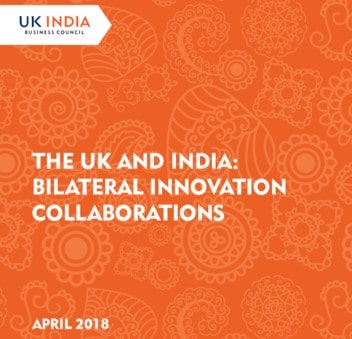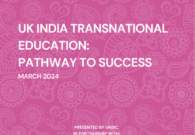UK-India Bilateral Innovation Collaborations
With Mr Modi visiting London this week it is important to reflect on an often under-reported aspect of the UK-India economic relationship – the innovative collaborations between businesses and universities.

There is no doubt that the trading relationship is good and growing and, as the recent UK India Business Council report, The UK and India: Bilateral Investment Relationship, sets out, the investment relationship is strong, getting stronger, and evolving.
UK investors see India’s market growing and becoming easier to navigate, and Indian investors have not been deterred by Brexit uncertainty. Indeed, they have increased their investment since the referendum vote. And as technologies, particular digital technologies, are disrupting every industry, we see the UK-India investment relationship evolving to focus ever-more on these technologies.
But it is not just about investments or, indeed trading, which our Bilateral Trade Relationship report covers. As detailed in the new UK India Business Council report, The UK and India: Bilateral Innovation Collaborations, the most exciting aspect of the UK-India partnership is the potential to increase innovation collaborations, with companies and universities from both countries working together to develop ground-breaking technologies.
As both economies find themselves in a state of transformation, exploring the capabilities and potential of these new technologies is key to economic success. India’s push to digitise and the UK’s history as an innovation powerhouse means that emerging technologies, including blockchain, AI, robotics, 3-D printing, autonomous vehicles, electric vehicles, other forms of green manufacturing, and big data, are areas that should be front and centre in the UK-India relationship.
What’s also exciting is that we are not just seeing industry-to industry collaborations. Businesses are racing to work with universities to utilise their knowledge, particularly in the digital and manufacturing spheres. An amazing example of this ‘industry-academia bridge’ is the Tata Motors/JLR collaboration with the Warwick Manufacturing Group (part of the University of Warwick), which will see the opening this year of the largest automotive R&D facility in Europe, which will research the future of mobility. This is not the only such example. There are many more, including close partnerships with Indian manufacturers PTC and Bharat Forge with the University of Sheffield’s Advanced Manufacturing Research Centre.
Beyond these industry-academia examples, there are brilliant industry-industry partnership. These include Bupa’s collaboration with Indian firms Practo and 1mg to create an easily accessible and customisable and holistic healthcare plan that brings health cover for Indians that currently can’t access insurance and therefore, quality healthcare.
Another example that utilises the power of emerging technologies is Rolls Royce’s and Tata Consultancy Services’ partnership to explore the applications of IoT in expanding Rolls Royce’s capabilities to deliver further value to its customers.
These partnerships are just the tip of an expanding iceberg
We know from talking to businesses and universities that governments play a pivotal role in enabling innovation, especially UK-India collaborative efforts. The Newton Bhabha Fund is a shining example of what the two governments are doing to promote innovation collaboration. Efforts like this need to also prioritise the emerging sectors, such as AI, as it is still in the early stages of industry development and funding helps initial ideas turn into real and transformational solutions.
Important and welcome as funding is, UK and Indian innovators tell us that the governments’ role extends further, and that there are a number of steps that could be taken to spur new partnerships:
a) Improve the overall operating environment – the ease of doing business – including measures that allow innovative businesses to maximise the commercial and societal benefits of their IP;
b) Greater regulator-to-regulator cooperation to share information and best practices, particularly in emerging digital spaces, such as FinTech, telecoms, and energy. And involve businesses in these dialogues so that innovators and regulators have a transparent relationship that allows all parties to move forward in tandem;
c) Increase the ease of movement of talent – students and professionals – between both countries, and allowing UK universities to set up campuses in India; and
d) both Governments should create a bridge and support system to enable UK and Indian academic institutes, start-ups, SMEs and larger businesses to come together to co-innovate. A key part of this bridge should be a pilot programme that provides hands-on guidance and support to tech-rich SMEs in both countries to help them find partners.
All this will ensure that an already thriving innovation relationship remains strong and that the UK and India will be able to collaborate to realise the opportunities of Industry 4.0, creating a win-win opportunity for both countries.







